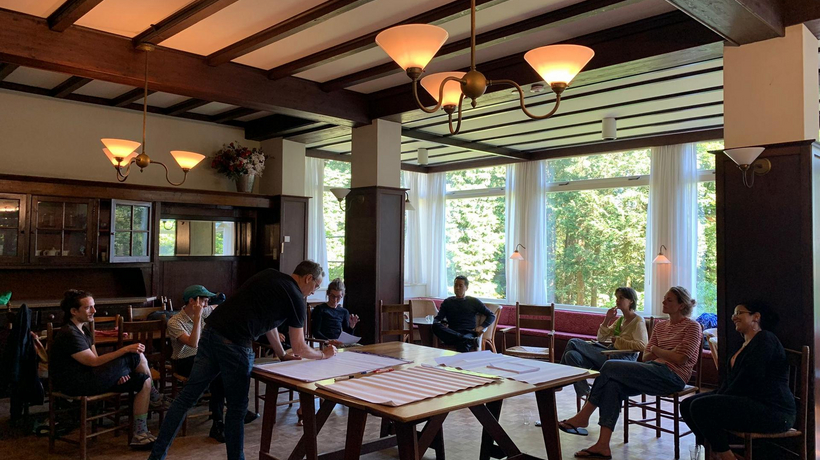The 2-year full-time practice driven MA-programme is divided into 4 semesters that each have their own focus. Together they create an ongoing research cycle of which the exams are an integral part. The programme uses three pedagogical ‘tools’ and provides a research budget.
Semester 1. Subjectivity and positioning
To understand ‘from where you speak’ and to take responsibility for that ‘point of view’ is perhaps the most important precondition for artistic research and for any artistic practice. This is why our programme starts from this notion of ‘subjectivity’. It determines what you do, how and why; it’s a position towards yourself, your work and the world. This is not to say though that it’s a given, on the contrary: subjectivity itself is a process and a space of research and exploration. Although it is related to questions of identity and psychology, ‘subjectivity’ cannot be reduced to autobiography. It is instead about authorship, about developing your singular vision and defending it.
This notion of subjectivity underlies all other semesters.
Semester 2. Method and methodology
Finding your own (working) method and (research) methodology is the focus of semester 2. We do not believe that there is, or should be, a predetermined or fixed methodology for artistic research in and through cinema. In line with our focus on subjectivity we believe that the methods of artistic research are individual, subjective and singular. In fact, we believe that what makes your ‘artistic signature’ is your singular research and production methodology.
Semester 3. Exploration and experimentation
Semester 3 is devoted to further exploring your research theme or project in an experimental manner. Experimentation in art and artistic research has less to do with testing assumptions or checking working methods, technologies or production strategies. Instead, artistic exploration and experimentation instead is about being open to surprises, detours and unexpected encounters – with knowledge, materials, references, technologies and people. Tracing, documenting and communicating that subjective process of exploration is part and parcel of the experimental attitude.
Semester 4. Conceptualisation and communication
The practice of art and artistic research organically leads to a desire or need of conceptualisation, of zooming out from the particularities to see a bigger picture, a wider context in which the research figures or can be meaningful. Like methodology and experimentation, conceptualisation starts from the researcher’s subjective understanding of concepts and notions used. Conceptualisation is at the core of artistic research as it enables insights, produces knowledge and gives rise to new questions. Part of the conceptualisation process is also, last but not least, how to share or communicate these insights and new questions with others.
There are three integrated pedagogical ‘tools’ that are in place to enable your artistic research journey: the curriculum, the mentoring system and the group.
The curriculum
The curriculum is made up of workshops that take your research interests as its material to work with. All workshops combine practice and reflection and are taught or moderated by filmmakers and artists whose own practice can itself be described as invested with an artistic research ethos. Aside from these workshops, there are regular inspiring public lectures by filmmakers, artists, philosophers or scientists, related to the theme of the semester.
Although it’s a full-time programme, there’s a distinction in the density of workshops between the first and second year. Whereas year 1 is primarily organised around workshops, year 2 focusses more on your individual research project and therefore has fewer workshops.
The mentoring system
You will be supported throughout your research process by a team of mentors, who will mentor and tutor you both individually and collectively in small research groups. We conceive of mentoring as a continuous professional dialogue, for which you also need to take responsibility. Mentoring sessions are aimed at strengthening your research abilities through systematic reflection on your practice.
At the end of the first year you’re stimulated to find external advisors who can support your research in a more specific or in-depth way. Depending on the nature of your research and your needs, it could be a single advisor or different ones at different moments of your process. You have a budget to pay them.
All mentors and most, if not all external advisors are artist-researchers themselves.
The peer group
Every year we select no more than ten researchers on the basis of their cv, portfolio and research interests, aiming to create a group that is inclusive in terms of gender, nationality and professional or artistic background. Because of its creative level and its diversity, the group will provide a stimulating and supportive environment for all.
Generally, we believe that the group is a very important, if not the most important learning tool. This is also why, particularly in the first year, there are many collective workshops and why we place a great importance on peer feedback. For this we use a specific technique that understands feedback not as a tool to judge but as a tool to think.
You will have a research budget to your disposal of around €10.000, which you can use to pay for fees for people you work with – including your external advisors –, rental of equipment (if the equipment is not available at the school), travel and festival visits, et cetera. Part of the budget is kept aside to pay for the concluding public presentation of your research during the Artistic Research Week at the end of the second year.






